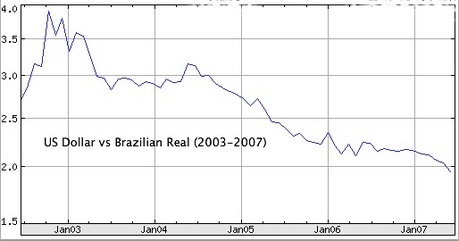US Dollar Falls 50% Against Brazilian Real
by John Schroy filed under Foreign Investors
Since 2003, the US dollar has fallen almost 50% against the Brazilian Real. What caused this to happen and what does it mean for the future of the dollar?
 US Dollar Devalued Against Brazilian Real
|
||
The reason for the strong real is the excess of Brazilian exports over imports, the result of government policy encouraging exports and discouraging imports. This has led to ever-larger dollar reserves.
Government policy resulting in extremely high internal interest rates attracts holder of these dollar reserves to invest in short-term Brazilian debt.
This is possible because of a convertible currency and dollar-real derivative products that allow foreign investors to take advantage of these high rates, while hedging against a possible decline in the value of the Brazilian real against the dollar.
Brazil has a cornucopia of valuable commodities to sell into world markets: iron ore, manganese, soybeans, coffee, cotton, castor seed, tin, rice, cashew, aluminium, black pepper, corn, and many other things.
In addition, Brazil has a powerful industrial base with low labor costs, producing everything from jet planes to automobiles to machine tools.
Brazilian exporters have a neo-mercantilist mentality, which means that they want to sell goods and commodities to receive hard currencies, primarily dollars. Brazilian economists and central bankers regard a surplus of dollar reserves as a good thing.
Heavy Tariffs Restrict Imports
The Brazilian authorities keep a large portion of export dollars by maintaining high tariffs and setting tough bureaucratic restrictions that discourage imports.
When all tariffs, imposts, and taxes are summed, the cost of imports landed in Brazil often exceeds 100% of the price received by the foreign exporter. These high costs protect local industry and keep imports lower than exports.
In 2006, Brazilian imports were 66% of exports. In Q1 2007, imports rose to 74.3% of exports. The resulting trade surplus exceeded Brazilian foreign debts.
High Taxes and Low Inflation
In recent years, Brazil has been able to overcome endemic inflation that has been the pattern for the last 400 years.
The key to this has been the imposition of taxes at a level that covers heavy government spending, soaking both the rich and the poor with value added, sales, and income taxes that eat up a large portion of the cost goods bought and sold.
Not only are taxes high, collection methods are intrusive. Residents of Brazil must have a tax number (CPF) that appears on checks, contracts, and bills of sale.
This makes it possible for the government to track individual spending habits and spot those with expenditures that seem to exceed reported income.
Big Brother is alive and well in Brazil.
High Interest Rates, Low Inflation, and Convertible Currency
Interest rates in Brazil, adjusted for inflation, are among the highest in the world.
This fact, together with a currency strengthening against the dollar, easily convertible, with availability of derivatives to hedge against currency risk, attracts foreign short term investment that further drives down the dollar against the Brazilian real.
The relationship between a trade surplus and interest rates that attract short-term investment, does not signal long-term weakness in the dollar, but rather a a temporary, short-term aberration brought about by Brazilian policies that are probably not sustainable in the long run.
The strong real against the dollar is already causing complaints from Brazilian manufacturers that are being priced out of world markets. Under employment and unemployment are high.
If current high-interest, high-tax, and hard currency accumulation policies continue, slow growth is inevitable and the poor in this lower middle income economy must accept living in poverty for the foreseeable future.
Why Things Are Not So Rosy
Despite the recent positive performance of the Brazilian real versus the US dollar, it would be a mistake to regard this either as a permanent trend or a sign that Brazil is now in the same category as successful economies like Singapore, Hong Kong, or Japan.
Although the rating services have upgraded Brazilian foreign debt, this paper is still one or two notches below investment grade. The GDP growth rate is now only 4.3%, far below the levels of the years of the Brazilian Miracle and insufficient to raise the standard of living of most Brazilians who are dreadfully poor.
Brazil is still classified by the World Bank as a Lower Middle Income Economy.
Although the left-wind government of President Lula has managed to stay in power by reducing inflation and by demagogic appeals to the masses, the price of rigorous inflation control is high taxes and high interest rates that repress economic growth.
Furthermore, the Brazil has an Economic Freedom Rating of only ‘moderately free’ and a Corruption Perception Index of 3.7 (out of 10).
Failure of Government’s Prime Responsibility
The Lula government has failed to maintain social order in major cities where drug lords and street gangs kill innocent citizens at will, daily.
No one knows for sure the death toll from crime in Brazil. One newspaper puts the annual homicide rate at 50,000 — a full scale war on a par with Iraq — while left-wing supporters of the government characterize the problem as “no worse than the United States” and “grossly exaggerated”.
However, the newspapers, which are still free, continue to herald the latest battle in a losing war against street crime, with news of daily shoot-outs between police and criminals, with lists of innocent civilians caught in the cross-fire.
The Girl from Ipanema now lies dead on the sidewalk, a victim of a stray bullet, as the posh bairro of Ipanema becomes what is described by O Globo as a war zone.
Residents fear to go into the streets of the major cities, even in broad daylight.
The dominance of criminal elements in society has grown steadily since leftist governments took over from the military in the early 1980s, and, with the end of the years of the ‘Brazilian Miracle’, crime should now be a major consideration in any economic evaluation of Brazil.
Dissatisfaction with the Lula government, which is generally characterized as corrupt, soft on crime, and and given to leftist folly, is evident from Brazilian newspapers or by talking with cab drivers in the large cities or people on the street. Something will give, sooner or later, and any significant political shift can cause the derivatives that now support the real-dollar rate to unwind.
How A Weak Dollar Signals Strength
If the dollar was not popular with Brazilian exporters and if the Brazilian government did not seek to build dollar reserves, there would be no excess dollars in Brazilian foreign accounts to swap into short-term Brazilian debt to take advantage of the high interest rates that restrain growth and inflation.
High real interest rates and taxes depress the rate of expansion of per capita GDP, which, in a country with an ever-widening gap between rich and poor increases political instability. The strong real against the dollar, reduces employment in the industrial sector, while easing up on import restrictions would damage domestic industry even more. With already high rates of unemployment, a strong real is not good news for the Brazilian economy.
Meanwhile, the rest of the world continues to build dollar reserves, as evidenced by the expanding US trade deficit.



